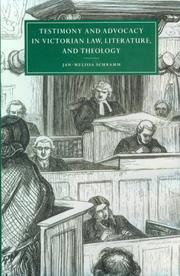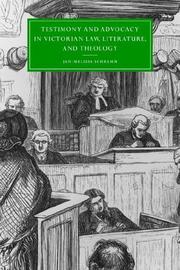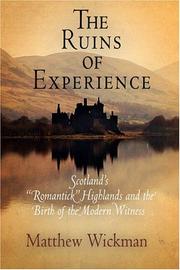| Listing 1 - 10 of 17 | << page >> |
Sort by
|
Book
ISBN: 9783770548309 9783846748305 Year: 2009 Publisher: München Fink
Abstract | Keywords | Export | Availability | Bookmark
 Loading...
Loading...Choose an application
- Reference Manager
- EndNote
- RefWorks (Direct export to RefWorks)
German literature --- Law and literature --- Witnesses in literature. --- History and criticism. --- History. --- Witnesses in literature --- Literature and law --- Literature --- Young Germany --- History and criticism --- History
Book
ISBN: 9783110751161 Year: 2021 Publisher: Berlin : De Gruyter
Abstract | Keywords | Export | Availability | Bookmark
 Loading...
Loading...Choose an application
- Reference Manager
- EndNote
- RefWorks (Direct export to RefWorks)
Evidence, Criminal, in literature. --- Greek literature --- Witnesses in literature. --- History and criticism.
Book
ISBN: 3846748307 Year: 2009 Publisher: Paderborn : Wilhelm Fink Verlag,
Abstract | Keywords | Export | Availability | Bookmark
 Loading...
Loading...Choose an application
- Reference Manager
- EndNote
- RefWorks (Direct export to RefWorks)
Was wissen Zeugen? Die neue Studie "Zeugenschaft. Das Recht der Literatur" untersucht die gemeinsame Geschichte von juristischer und literarischer Wahrheitsfindung. Ohne das Wissen von Zeugen könnte kaum ein Gerichtsverfahren zu Ende geführt werden. Zeugen sind notwendig, um der Wahrheit auf den Grund zu gehen. Dabei ist jedem Juristen klar: Zeugenaussagen stammen von unzuverlässigen Erzählern. Sie geben subjektive Sichtweisen, wo man gern auf Objektivität vertrauen würde. Mit Hilfe des Zeugen aber können Tatsachen im Zusammenhang begriffen werden. Und erst dadurch wird es möglich, über vergangene Ereignisse zu verhandeln. Der Zeuge verkörpert den narrativen Kern des Rechts - und das Recht der Literatur, von Welt und Wahrheit zu erzählen. Das Buch rekonstruiert diesen Zusammenhang ausgehend von der Epoche der Aufklärung, die gleichermaßen ein neues, zeugenschaftliches Beweisrecht und neue literarische Formen schuf, die von der Figur des Zeugen getragen wurde.
German literature --- Witnesses in literature. --- Law and literature --- History and criticism. --- History. --- Deutsch.
Book
ISBN: 0415899095 1315880288 9780415899093 9781315880280 Year: 2014 Publisher: New York : Routledge,
Abstract | Keywords | Export | Availability | Bookmark
 Loading...
Loading...Choose an application
- Reference Manager
- EndNote
- RefWorks (Direct export to RefWorks)
Literature. --- Memory in literature. --- Memory. --- Poetry --- Poetry. --- Psychic trauma in literature. --- Psychic trauma. --- Self-disclosure in literature. --- Self-disclosure. --- Witnesses in literature. --- Witnesses. --- History and criticism. --- 1900-1999.
Book
ISBN: 9781501310898 1501310895 Year: 2014 Publisher: London : Bloomsbury,
Abstract | Keywords | Export | Availability | Bookmark
 Loading...
Loading...Choose an application
- Reference Manager
- EndNote
- RefWorks (Direct export to RefWorks)
"Queer Postcolonial Narratives and the Ethics of Witnessing is a critical study of the relationship between bodies, memories and communal witnessing. With a focus on the aesthetics and politics of queer postcolonial narratives, this book examines how unspeakable traumas of colonial and familial violence are communicated through the body. Exploring multisensory epistemologies as queer and anti-colonial acts of resistance, McCormack offers an original engagement with collective and public forms of bearing witness that may emerge in response to institutionalized violence. Intergenerational, communal and fragmented narratives are central to this analysis of ethics, witnessing, and embodied memories. Queer Postcolonial Narratives and the Ethics of Witnessing is the first text to offer a sustained analysis of Judith Butler's and Homi Bhabha's intersecting theories of performativity, and to draw out the centrality of witnessing to the performative structure of power. It moves through queer, postcolonial, disability and trauma studies to explore how the repetition of familial violence – throughout multiple generations –may be lessened through an embodied witnessing that is simultaneously painful, disturbing and filled with pleasure. Its focus is selected literary texts by Shani Mootoo, Tahar Ben Jelloun and Ann-Marie MacDonald, and it situates this literary analysis in the colonial histories of Trinidad, Morocco and Canada." --
Power (Social sciences) in literature. --- Witnesses in literature. --- Postcolonialism in literature. --- Violence in literature. --- Queer theory. --- Testimony (Theory of knowledge) --- Pouvoir (Sciences sociales) dans la littérature. --- Postcolonialisme dans la littérature. --- Violence dans la littérature. --- Théorie queer. --- Témoignage (Théorie de la connaissance) --- Postcolonialism in literature --- Power (Social sciences) in literature --- Queer theory --- Violence in literature --- Witnesses in literature
Book
ISBN: 9780415854450 9781135010010 9781135009991 9781135010003 Year: 2014 Publisher: New York : Routledge,
Abstract | Keywords | Export | Availability | Bookmark
 Loading...
Loading...Choose an application
- Reference Manager
- EndNote
- RefWorks (Direct export to RefWorks)
Celebrating the twentieth anniversary of the groundbreaking Testimony, this collection brings together the leading academics from a range of scholarly fields to explore the meaning, use, and value of testimony in law and politics, its relationship to other forms of writing like literature and poetry, and its place in society. It visits testimony in relation to a range of critical developments, including the rise of Truth Commissions and the explosion and radical extension of human rights discourse; renewed cultural interest in perpetrators of violence alongside the phenomenal commercial success of victim testimony (in the form of misery memoirs); and the emergence of disciplinary interest in genocide, terror, and other violent atrocities. These issues are necessarily inflected by the question of witnessing violence, pain, and suffering at both the local and global level, across cultures, and in postcolonial contexts. At the volume's core is an interdisciplinary concern over the current and future nature of witnessing as it plays out through a 'new' Europe, post-9/11 US, war-torn Africa, and in countless refugee and detention centers, and as it is worked out by lawyers, journalists, medics, and novelists. The collection draws together an international range of case-studies, including discussion of the former Yugoslavia, Gaza, and Rwanda, and encompasses a cross-disciplinary set of texts, novels, plays, testimonial writing, and hybrid testimonies. The volume situates itself at the cutting-edge of debate and as such brings together the leading thinkers in the field, requiring that each address the future, anticipating and setting the future terms of debate on the importance of testimony.
Psychic trauma in literature. --- Testimony (Theory of knowledge) --- Witnesses in literature. --- Recollection (Psychology) --- Memory --- Psychic trauma and mass media. --- LITERARY CRITICISM / General. --- SOCIAL SCIENCE / Violence in Society. --- Social aspects. --- Witnesses. --- Truth commissions. --- Human rights.
Book
ISBN: 0814270182 0814212239 0814256953 Year: 2013 Publisher: Columbus : Ohio State University Press,
Abstract | Keywords | Export | Availability | Bookmark
 Loading...
Loading...Choose an application
- Reference Manager
- EndNote
- RefWorks (Direct export to RefWorks)
Witness bearing (Christianity) --- Witnesses. --- Witnesses in literature. --- English literature --- History and criticism. --- Testimony --- Evidence (Law) --- Eyewitness identification --- Bearing witness (Christianity) --- Personal evangelism --- Testimony (Christianity) --- Witnessing for Christ --- Apologetics --- Evangelistic work

ISBN: 0511049455 0511151039 0511010060 9780511010064 0511034210 9780511034213 9780511151033 9780521771238 0521771234 9780511049453 Year: 2000 Publisher: Cambridge, UK ; New York : Cambridge University Press,
Abstract | Keywords | Export | Availability | Bookmark
 Loading...
Loading...Choose an application
- Reference Manager
- EndNote
- RefWorks (Direct export to RefWorks)
This original and wide-ranging study shows how changing attitudes to evidence, trial and revelation in law and theology had a profound impact on literary narrative in the nineteenth century. Jan-Melissa Schramm, who is both a lawyer and a literary critic, argues that authors of fiction created a style of literary advocacy that both imitated, and reacted against, the example of their story-telling counterparts of the criminal Bar, and traces the ongoing debate over rules of evidence, eye-witness testimony and codes of ethical conduct that helped shape Victorian realism as a narrative form.
English literature --- Law and literature. --- Evidence, Criminal, in literature. --- Witnesses in literature. --- Theology in literature. --- Trials in literature. --- Narration (Rhetoric) --- Narrative (Rhetoric) --- Narrative writing --- Rhetoric --- Discourse analysis, Narrative --- Narratees (Rhetoric) --- Literature and law --- Literature --- History and criticism.

ISBN: 9780521026352 Year: 2006 Publisher: Cambridge ; New York : Cambridge University Press,
Abstract | Keywords | Export | Availability | Bookmark
 Loading...
Loading...Choose an application
- Reference Manager
- EndNote
- RefWorks (Direct export to RefWorks)
English fiction --- English fiction. --- English literature --- English literature. --- Evidence (Law). --- Evidence, Criminal, in literature. --- Law and literature. --- Narration (Rhetoric). --- Theology in literature. --- Trials in literature. --- Witnesses in literature. --- History and criticism --- 1700-1899.

ISBN: 0812239717 9780812239713 1322514283 081220395X Year: 2007 Publisher: Philadelphia University of Pennsylvania Press
Abstract | Keywords | Export | Availability | Bookmark
 Loading...
Loading...Choose an application
- Reference Manager
- EndNote
- RefWorks (Direct export to RefWorks)
There emerged, during the latter half of the eighteenth century, a reflexive relationship between shifting codes of legal evidence in British courtrooms and the growing fascination throughout Europe with the "primitive" Scottish Highlands. New methods for determining evidential truth, linked with the growing prominence of lawyers and a formalized division of labor between witnesses and jurors, combined to devalue the authority of witness testimony, magnifying the rupture between experience and knowledge. Juries now pronounced verdicts based not upon the certainty of direct experience but rather upon abstractions of probability or reasonable likelihood. Yet even as these changes were occurring, the Scottish Highlands and Hebridean Islands were attracting increased attention as a region where witness experience in sublime and communal forms had managed to trump enlightened progress and the probabilistic, abstract, and mediated mentality on which the Enlightenment was predicated. There, in a remote corner of Britain, natives and tourists beheld things that surpassed enlightened understanding; experience was becoming all the more alluring to the extent that it signified something other than knowledge. Matthew Wickman examines this uncanny return of experiential authority at the very moment of its supposed decline and traces the alluring improbability of experience into our own time. Thematic in its focus and cross-disciplinary in its approach, The Ruins of Experience situates the literary next to the nonliterary, the old beside the new. Wickman looks to poems, novels, philosophical texts, travel narratives, contemporary theory, and evidential treatises and trial narratives to suggest an alternative historical view of the paradoxical tensions of the Enlightenment and Romantic eras.
English literature --- Evidence (Law) --- Experience in literature --- Knowledge, Theory of --- Literature --- Scottish literature --- Subjectivity in literature --- Witnesses in literature --- Extrinsic evidence --- Parol evidence --- Trial evidence --- Actions and defenses --- Judicial process --- Trial practice --- Estoppel --- Appraisal of books --- Books --- Evaluation of literature --- Criticism --- Literary style --- Epistemology --- Theory of knowledge --- Philosophy --- Psychology --- British literature --- Inklings (Group of writers) --- Nonsense Club (Group of writers) --- Order of the Fancy (Group of writers) --- Scottish authors&delete& --- History and criticism --- Appraisal --- Evaluation --- Highlands (Scotland) --- Highlands of Scotland (Scotland) --- Scottish Highlands (Scotland) --- In literature. --- Experience in literature. --- Knowledge, Theory of. --- Subjectivity in literature. --- Witnesses in literature. --- Scottish authors --- History and criticism. --- Cultural Studies. --- Literature.
| Listing 1 - 10 of 17 | << page >> |
Sort by
|

 Search
Search Feedback
Feedback About UniCat
About UniCat  Help
Help News
News